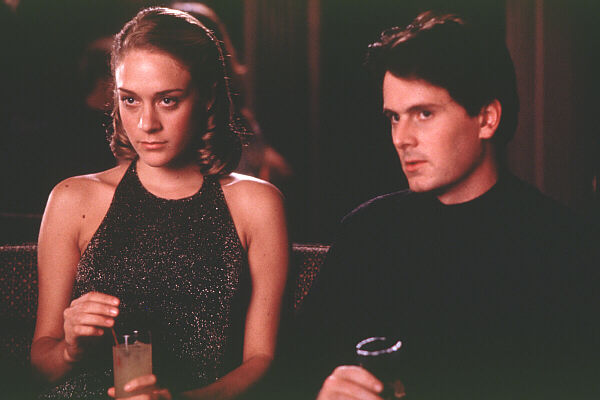
I'm going to complain. I'm going to give a mediocre rating. I'm also going to specifically state that I really enjoyed The Big Kahuna.
The Big Kahuna is based on a play. It never managed to convince me that it shouldn't have stayed that way. The situation, the dialogue, the directing - it's very stagey. I'm not saying that the characters act contradictory to their personalities or motives, or that I didn't believe the characters meant what they said. I just don't think they'd say the things they said at the that time, all together on that night. Danny Devito's character is said to have been dealing with a lot leading up to that night, but it comes at a bit of a surprise that his crisis-of-sorts is a spiritual one (among other factors) when he is presently surrounded by a young company researcher (Peter Facinelli) and his friend and fellow marketer (Kevin Spacey) engaged in a back-and-forth dialogue about spirituality and the qualities of man. The film is a short, neat little film that is too short to be cinematic, and too confined to be interestingly blocked and filmed. It also showcases the nasty habit/tell-tale-sign that it's a play masquerading as a film. It uses slow motion every so often just to remind the viewer that what they are watching is in fact a film - edited and designed in such a manner. I wasn't fooled. I was bothered.
The acting is superb. The characters are essentially locked into a pattern of actions, reactions, and motives. However, that works in the small confinements of the runtime and reality of the film. The writing and actors run the risk of creating one-note performances, but each character is complicated. They're learning things about themselves, about each other, and coming to grips with where they fit into the world and their jobs. Spacey's Larry is invested in his job, cynical about the state of the people he bumps into in his line of work, and certain that spirituality has it's place in the occasional pondering without dwelling on it. Facinelli's Bob (the ring with which Spacey says "Bob" is soaked with cynicism, wit, and tiredness - which I loved each time he said it) is green in the business, but practiced in his faith and the role it plays in his life. Devito's Phil is at a crossroads where he's questioning the life he's made for himself and the role of God in his life.
Facinelli spends much of the film reacting, letting his fish-out-of-waterness show at every turn. I wasn't expecting much from him, mostly because he disappeared after his run on the FOX TV show Fastlane. He fills the role well. It's captivating to see his character truly challenged in his beliefs, to face the way he relates them to others.
Spacey is doing a conglomeration of other Spacey performances (the cynicism of American Beauty, the suit and tie mentality of Glengarry Glen Ross, and the energy/dry sarcasm/wit of The Usual Suspects/Hurlyburly/The Negotiator). When his Phil enters the room at the beginning of the film, it is in like a tornado ripping through what was briefly a tranquil conversation between Bob and Phil. And he remains that way for much of the film, save a few interesting moments where he's relaxed and in conversation with his friend, colleague, and seasoned pal Phil. I recently listened to a
review of Superman Returns on Filmspotting.net (right click and choose "Save Target As" to give it a listen) to where one critic said that Kevin Spacey is the most overrated actor of the last 25 years. It's a bold statement and one that I do not agree with. I am, however, becoming more aware of Spacey's habit of falling back into his old bag of tricks (similar to the way Jack Nicholson's performances are often criticized). I love the bag of tricks, but I would like to see a performance from my once-favorite actor that forced him to step outside and try something completely new (and succeed at it).
And Devito. I forgot he can act. He delivers a mannered performance that shows remarkable restraint although it only briefly slides into staginess. He's been in limbo the last few years, although he infamously turned up as a blathering loon on The View. I wish he'd get more chances to
really act again. He's got the chops.
The film is confident in its subject matter. It has something meaningful to say about evangelism, cynicism, identity related to your work, and more. But what really struck me is how honestly The Big Kahuna discusses Christianity. The film makes points, but doesn't bang the Christ gavel over the viewer's head. And I guess that's the chief message: being honest about your beliefs and your motives in relating those to other people. Try not to
sell your beliefs.
I'd like to see this material performed as a play with these actors. I'd like that.
***







